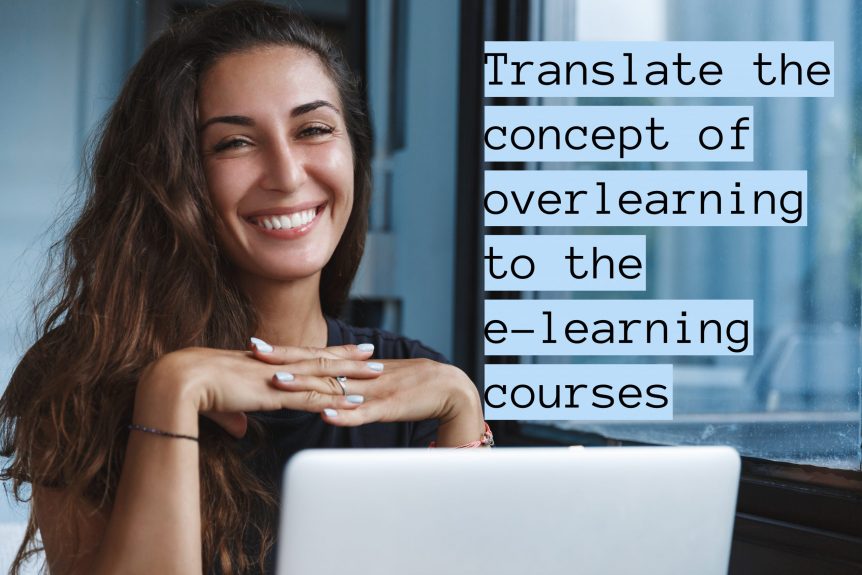How to Use the Concept of Overlearning to Improve Outcomes from E-Learning Courses
Usually doing something too much – over-eating, overtraining, oversleeping – is not a good thing. When learning a new skill, however, overlearning is very beneficial. It results in you being able to perform tasks without having to think too much about what you are doing, and it helps prevent you from forgetting how to complete tasks.
How can you translate the concept of overlearning to the e-learning courses you develop?
Before going into those practical specifics, let’s first look in more detail at the concept of overlearning and what it means.
What is Overlearning?
With overlearning, mastering or learning a skill is not the goal. When a learner masters or learns a new skill, understands a new concept, or acquires new knowledge, all you truly know is that they have the capability at that moment.
However, you don’t know much about their capabilities in the future. They could forget the knowledge or skill completely, or their understanding of the concept could become confused. In the workplace, this leads to poor performance, decision-making, and outcomes.
The jargon we sometimes use to refer to this in the e-learning industry is knowledge retention, i.e., a learner might successfully complete a course today, but will they retain the knowledge in one, three, or six months?
The objective of overlearning is to ensure the learner does retain the information over the long-term.
Practice Makes Perfect
The cliché practice makes perfect is relevant in this situation, particularly as we look for examples of overlearning.
There are many good examples of overlearning in sports, so that is a good place to start. One of the most explicit comes from American Football.
This was in a game between the Atlanta Falcons and the Detroit Lions. It was close to the end of the game, and the Falcons were losing, but they had the ball close to the scoring area.
The problem was that there was still too much time left in the game. So, the team decided to go with a play that would NOT result in a score but would run the clock down. According to the plan, just as time was going to run out, they would score an easy kick to goal and win the game.
During the play, the ball ended up in the hands of running back Todd Gurley. All you need to know about running backs is that their job is to run as far as possible before being tackled. Gurley had been told not to score, but in the heat of battle, his muscle memory kicked in and he kept on running. His brain realised what was happening and he tried to stop his momentum, but it was too late – he scored.
And the result? The Falcons were now winning, but there was enough time on the clock for their opponents to score at the other end of the field, which they duly did.
So, in this example, muscle memory, achieved through thousands of hours of work on the practice field and in game conditions, was so powerful that it cost this American Football team a win.
Other Muscle Memory and Overlearning Examples
There are many other examples of the power of muscle memory and overlearning:
- Musicians being able to play songs while barely thinking about what they are doing.
The finest musicians will keep practising songs for hours, even after they’ve mastered them.
- Actors performing in stage plays are another example. They learn their lines, the emotions of the role, where they need to stand, and what they need to do until all these things become like second nature to them.
- Experts in any field, including in industry, science, and technology, are another example. This is because experts who can perform tasks perfectly often find it difficult to explain in detail the steps involved. They invariably leave out important elements – elements they have overlearned and now complete without even thinking about them.
Applying the Concept of Overlearning to Your E-learning Courses
So, overlearning is not about knowing how to complete a task. Instead, it’s about knowing how to do the task while barely thinking about it. It’s also about knowing how to do it and never forgetting.
Here are some ways you can apply the concept of overlearning to your e-learning courses to improve outcomes.
- Spaced repetition – spaced repetition is a technique where you revisit concepts or ideas at set intervals during an e-learning course. The intervals get longer over time as the memory of the learner consolidates.
- Learning by doing – overlearning requires doing, i.e., active learning rather than passive learning. So, include things like scenarios in your e-learning courses, particularly multi-layered branching scenarios.
- Focusing on the topic – there is research that indicates that learning different tasks or concepts too close together results in reduced knowledge retention. So, keep your e-learning courses focused on a single topic, skill, or task as much as possible.
- Following up after the completion of a course – go back to learners about a month after they complete an e-learning course to refresh their memory and re-test their knowledge or skill capability.
- Create refresher courses – include the creation of refresher courses in your training strategy. Refresher courses can sometimes be met with resistance as learners complain they already understand the topic or can perform the skill. Well designed and implemented refresher courses can help overcome this resistance, as can using e-learning as the delivery method.
Going Beyond Initial Understanding and Skill Capability
The concept of overlearning can deliver real and lasting positive change in your business, from adding new skillsets to improving performance and productivity. The examples we see in sports and the arts can be translated to the workplace and will drive further improvements in the return on investment you achieve from training activities.

